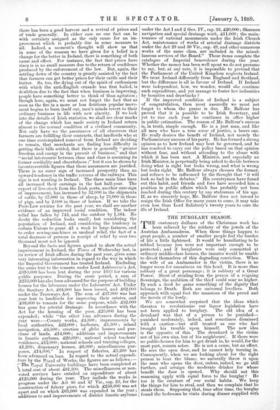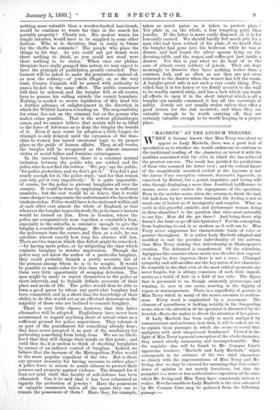THE BURGLARY SEASON. T HE customary dullness of the Christmas week
has been relieved by the robbery of the jewels of the Austrian Ambassadress. When these things happen to great people, a number of smaller people feel the burden of life a little lightened. It would be humiliating to be robbed because you were not important enough to be protected ; and if burglaries were only committed at ordinary middle-class houses, the inmates would be unable to divest themselves of this degrading conviction. When the wife of an Ambassador is the victim, there is no longer room for uneasiness on this head. It is more than robbery of a great personage; it is robbery of a Great Power. Short of stealing from the person of a reigning Sovereign, the ambition of the thief could soar no higher. By such a deed he gains something of the dignity that belongs to Death. Both are universal levellers. Both approach with equal foot the mansions of the proud and the hovels of the lowly.
We are somewhat surprised that the ideas which threaten to revolutionise our liquor legislation have not been applied to burglary. The old idea of a drunkard was that of a person to be punished— punished moderately, indeed, and sometimes dismissed with a caution—but still treated as one who had brought his trouble upon himself. The new idea is the opposite of this. The drunkard is the victim not of his own sins, but of his neighbours'. If there were no public-houses for him to get drunk in, he would, for the most part, remain sober. He is not a cause, but an effect. He sees the open door, and he cannot help turning in. Consequently, when we are looking about for the right person to bear the blame, we naturally throw it upon the man who opens the door, unless, indeed, we go still further, and arraign the moderate drinker for whose benefit the door is opened. Why should not this reasoning apply with equal force to the burglar ? He too is the creature of our social habits. We keep the things for him to steal, and then we complain that he steals them. Supposing that, time after time, the burglar found the bedrooms he visits during dinner supplied with nothing more valuable than a wooden-backed hair-brush, would he continue to waste his time in the search for portable property ? Clearly not. His modest wants, his simple luxuries, would have to be supplied in some other fashion. Who is it, therefore, that is really to blame for the thefts he commits ? The people who place the things in his way. As you could not get drunk were there nothing to drink, so you could not steal were there nothing to be stolen. When once our philan- thropists have really grasped this notion, we may expect to have the principle of prohibition greatly extended. Par- liament will be asked to make the possession—instead of, as now, the robbery—of jewels illegal ; or, at the very least, County Councils will be armed with authority to pass a by-law to the same effect. The public conscience will thus be relieved, and the burglar will, at all events, have to pursue his calling outside the county boundary. Nothing is needed to secure legislation of this kind but a further advance of enlightenment in the direction in which Sir Wilfrid Lawson is leading us. The responsibility for crime lies not on the criminal, but on the person who makes crime possible. That is the newest philanthropic canon, and we cannot believe that society will be so blind to the force of inference as to deny the burglar the benefit of it. Even if men resist its adoption a little longer, its triumph is only delayed until the extension of the fran- chise to women has raised emotional logic to its proper place as the guide of human affairs. Then, at all events, the burglar will be recognised as the almost innocent victim of social follies and feminine extravagance.
In the interval, however, there is a constant mutual irritation between the public who are robbed and the police who do not find the robber. We pay,' say the public, for police protection, and we don't get it.' 'You don't pay nearly enough for it,' the police reply, and for that reason you only get it very imperfectly.' It is quite impossible, of course, for the police to prevent burglaries all over the country. It could be done by employing them in sufficient numbers ; but the cost would be so heavy, that it would come cheaper to compensate the unfortunates who have their trinkets stolen. Police would have to be stationed within call of each other over almost the whole of England, so that wherever the burglar began his work, the policeman's lantern would be turned on him. Even in London, where the police are comparatively near together, a constable's beat, especially in the suburbs, is extensive enough to give the burglar a considerable advantage. He has only to watch the policeman turn the corner, and then, as a rule, he can calculate almost exactly how long his absence will last. There are two ways in which this defect might be remedied, —by having more police, or by subjecting the class which commits burglary to stricter supervision. Though the police may not know the author of a particular burglary, they could probably furnish a pretty accurate list of the persons among whom he is to be sought. It would be possible to make rules for this class which should leave them very little opportunity of escaping detection. The men might be made to report themselves to the police at short intervals, and to furnish definite accounts of their place and mode of life. The police would thus be able to form a good guess by whom any particular burglary had been committed, and in a short time the knowledge of their ability to do this would act as an effectual deterrent on the majority of those who are inclined to commit burglary.
There is very little chance, however, that this latter alternative will be adopted. Englishmen have never been accustomed to regard anything short of actual crime as a sufficient ground for police supervision. They tolerate it as part of the punishment for something already done ; they have never accepted it as part of the machinery for preventing something from being done. We see no likeli- hood that they will change their minds on this point ; and until they do, it is useless to think of checking burglaries by means of an indirect control of burglars. Indeed, we believe that the increase of the Metropolitan Police would be the more popular expedient of the two. But is there any present necessity for having recourse to either plan ? A pohce force is meant to assist citizens to protect their persons and property against violence. The demand for it does not arise until this faculty of self-defence has been exhausted. Can it be said that it has been exhausted as regards the protection of jewelry ? Have the possessors of valuable ornaments taken all the pains they can to remain the possessors of them ? Have they, for example, taken as much pains as is taken to protect plate ? Yet plate is, on the whole, a less tempting prize than jewelry. If the latter is more easily disposed of, it is far less easily carried. We should hardly feel much pity for a man who had been robbed of his plate, if we heard that the burglar had gone into his bedroom while he was at dinner, and had found the silver spoons lying on the dressing-table, and the teapot and coffee-pot just inside a drawer. Yet this is just what we do hear of in the case of almost every robbery of jewels. They are kept seemingly in drawers that have nothing better than a common lock, and as often as not they are not even returned to the drawer when the wearer has left the room. A burglar-proof safe is not such a very costly thing. Pro- vided that it is too heavy or too firmly secured to the wall to be readily carried away, and has a lock which can resist all efforts to open it in the short interval which is all a burglar can usually command, it has all the essentials of safety. Jewels are not usually stolen unless they offer a good return for the risk incurred ; and when they are valuable enough to be worth carrying off, they are certainly valuable enough to be worth keeping in a proper place.















































 Previous page
Previous page